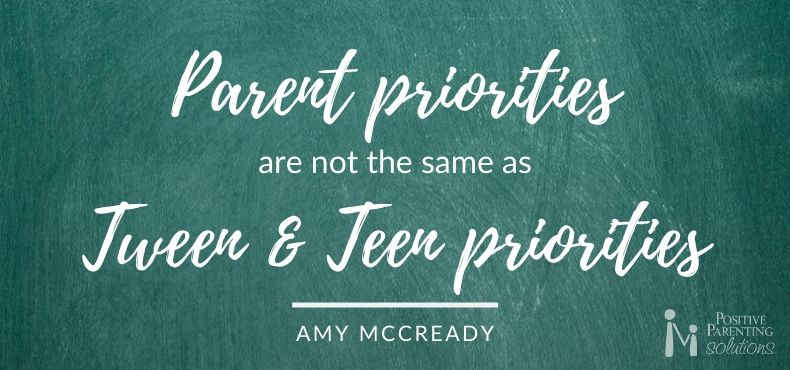5 Pitfalls To Avoid With Your Tween or Teen

Are you experiencing an influx of eye rolls, annoyed sighs, and slammed doors?
Have you repeatedly been told you know nothing, despite the fact that you’ve been around for decades? Maybe you’re freshly naive to music trends and just generally uncool?
If so, chances are you have a tween or teen in your house.
The tween and teen years are notorious, and not without reason. It can be a turbulent time for both you and your young adult, and your relationship may be continually tested.
Tweens, or kids between the ages of 8-12, are starting to experience puberty, societal pressure, and additional responsibility. Teenagers are experiencing these same problems, while also increasingly identifying outside the family unit.
Maneuvering through these new obstacles is all part of your child’s individualization process, and although it can be painful for all parties involved, it’s a necessary step towards adulthood.
Knowing these growing pains are normal may not make it easier, but there are a few common parenting mistakes that unwittingly worsen the process. Becoming familiar with these pitfalls can give you and your tween or teen a better chance at surviving these years unscathed.
Pitfall #1: Maintaining Too Much Control
Kids in the tween and teen years are ready for increasing amounts of responsibility and privilege. Understandably though, parents can be terrified of letting go. As a result, we tend to “clamp down” and exert more control over our kids. This is where a lot of heated power struggles arise.
Instead of tightening your grip, respect your child’s need for autonomy and let go more and more as he grows older. Look for opportunities to give him more responsibility and let him practice his decision-making skills.
You could encourage your child to decide any of the following: after-school activities he’d like to participate in; which dinner he’d like to help cook each week; or when and how he’d like to complete his homework each evening.
When we empower our kids with age-appropriate choices, we give them a strong sense of confidence.
Make sure he knows the kind of behavior you expect from him, as well as what will happen if he decides to test your limits. The more he succeeds, however, the more leeway you can offer. With a little more control over his life, your tween or teen will thrive–and you’ll love seeing his confidence and independence grow.
Pitfall #2: Nagging and Directing
Why do even the most well-intentioned parents feel required to nag, direct, and get bossy with their kids?
Because if we don’t, nothing gets done. Am I right?
As frustrating as it is, this is the reality for most families.
Unfortunately, all of our well-intended reminding and directing usually results in those eye rolls, exasperated huffs, and slammed doors.
That’s because we fail to understand a fundamental truth bomb of parenting: Parent priorities are not the same as tween and teen priorities.
This seems completely obvious, but it’s at the core of most power struggles with your tween or teen. Think about it–they aren’t concerned about messy rooms, unloaded dishwashers, or piles of dirty laundry stacked in the closet. Those are parent priorities.
Your teen’s priorities are next week’s chemistry exam, posting her Instagram story in time to get plenty of views, and finding a dress for the Homecoming dance. The ins and outs of maintaining an orderly and chaos-free home don’t even register on her radar.

While it’s our job to teach our kids responsibility, if we try to do this by nagging and directing, we won’t get very far. In fact, we’ll have more power struggles than we ever bargained for.
If we want our kids to respect us, we need to respect them.
Ensure your requests are reasonable and phrased in a calm voice. Use phrases like, “What is your plan for completing (x)?” This demonstrates faith that they already have a plan in place. And even if they don’t, they can quickly save face and come up with a game plan on the spot.
You can still hold your child accountable for what you ask, but do so in a way that empowers her to learn from her choices.
Also, be sure to show appreciation when your tween/teen helps out–even if it’s for an “expected” job. Everyone wants to know they make a difference, and showing gratitude will go a long way in fostering a team spirit in your family.
Along those lines, I encourage parents to ditch the word “chores” and instead label tasks as “Family Contributions.” This simple change in terminology reminds kids that what they do to help out around the house is beneficial to the entire family–even if they don’t want to do it.
If you’re still having trouble getting your tween or teen to comply, here are 4 of my favorite strategies to increase your child’s cooperation.
Pitfall #3: Allowing a Loss in Connection
It may seem like our tweens and teens don’t want to have anything to do with us. To a certain degree, this may be true. And yes, we need to start allowing them more independence.
But, during the transition from childhood to adulthood, our kids still need our guidance. Perhaps we have to sit shotgun and stop driving the car (literally and figuratively), but knowing we’re there to give directions–only if requested, of course–is crucial to their peace of mind.
Make sure your presence and availability is known, even if it feels like your kids are pushing you away. The backtalk may be unbearable, or their attitude hurtful, but it’s best not to completely retreat. If you see any openings in connection, seize them.
You can leave sticky notes around the house to remind them that you’re thinking of them or send them encouraging texts throughout the day–maybe in preparation for a big soccer game or play audition…or maybe just because. And why not stay relevant in the latest forms of communication and send a funny Snapchat while you’re at it?
Technology can actually be a great avenue for bonding with your kids–just be aware of how technology may be negatively affecting your family, too. With cell phones, video games, TV, and computers, kids–especially tweens and teens–spend an exorbitant amount of time staring at screens. If you notice technology taking the place of one-on-one quality time with your kids, start limiting usage to maintain that connection.
I know. Limiting usage will make you unpopular. But your one-on-one time together doesn’t need to be long (unless you both want it to be!). Just 10-15 minutes of undivided time between you and your child each day will do wonders for your connection with one other. Make sure you’re doing something that your child wants to do to ensure participation (unless, of course, all she wants to do with you is still stare at her phone).
Also, don’t abandon the “tuck in” concept. Yes, “tucking kids in” may be something we just do with our little ones, but the idea of spending quality time with our tweens and teens before bed–and setting them up for positive, peaceful sleep–is still relevant. We can read them a chapter from a chapter book, talk about their favorite–and least favorite–parts of the day, and even sneak in a cuddle. Whatever your tween or teen might suggest doing during this quiet time before bed is an amazing opportunity to connect.
Pitfall #4: Fearing Failure
Anxiety is a leading problem in young adults today. Elementary school, middle school, and high school standards have only increased in recent years. Extracurricular activities and schedules have been amplified to an almost unmanageable pace. College applications, volunteer requirements, testing, scholarships…the pressures kids face are intense.
It’s tempting for parents to be overly invested in their kids’ success and rescue them from their struggles or intervene with teachers or coaches on their behalf.
Again, we need to have faith in our kids’ abilities and loosen the reins during this time. We need to step back and let our kids handle the increased responsibility. We need to let them learn to succeed on their own.
We also need to let them fail.
Added pressure and unreasonable expectations from parents may make your tweens and teens feel like failure is unacceptable, but embracing defeat is a crucial skill. Because failure of varying degrees will be an inevitable part of their lives, learning the skills to overcome adversity might be the most important lesson of all.
As hard as it might be, let your flailing science student fail a test. Let him understand that even though a bad grade isn’t ideal, the world isn’t going to end. Also, know that most kids will receive enough pressure from their teachers, peers, and countless others to make their failure memorable. Instead, focus on creating a safe space between you and your child where failure can be embraced, reflected upon, and surpassed.
Pitfall #5: Forgetting That It’s Not About YOU
You may be heartbroken because the little girl who used to pick you flowers and hold your hand now has KEEP OUT posted on her door. Or maybe you lie awake at night because the little boy who asked if he could marry you now asks you to drop him off, unseen, a block away from school.
When our tweens and teens are distant towards us, short-tempered, uncommunicative, and just different than they were before, we tend to take it personally.
Remember, kids are prioritizing their friends during this time of their lives. They’re also just struggling with growing up. It’s hard, stressful–hormonal–and all of this can manifest into negative attitudes and behaviors. It may feel personal, and it can really hurt your feelings, but it’s not about you.
Your daughter could be stressing over exams, a recent break-up, an ill-timed pimple, or college applications. It’s easy to be defensive when she takes all her stress out on you. A better tactic is to try to see things from her perspective. You can also rest assured that she still needs your love and support–it just may be harder for her to show it.
By remembering that it’s not about us, we can adapt our feelings, expectations, and strategies to focus on our kids and what they need.
And I promise–one day they’ll thank you for it.
Final Thoughts
I know what’s it’s like to have tweens and teens in the house and the frustration you may be feeling. I designed my course, Positive Parenting Solutions, to help parents like you find a way through these challenges.
Even if your “kids” are older and just a few years away from “leaving the nest,” I encourage you to try my FREE CLASS and learn more tools to use on your parenting adventures.
By avoiding common pitfalls and adding more positive parenting tactics, the roller coaster of parenting–which is far from over–will soon become smooth sailing.
And who knows? In your tween or teen’s eyes, you might even become cool again.
Slightly.
Title Image: Alena Ozerova / Shutterstock https://www.shutterstock.com/photos
What You Should Do Next:
1. Subscribe to my Newsletter:
Sign up for my newsletter for parenting tips to help you create a happier home and become the parent you always wanted to be. Plus, when you subscribe, I'll also send you a copy of our strategy-packed guide 10 Tips for Better Behavior – Starting NOW!
2. Register for my FREE 60-Minute Class:
Register for my free class called How to Get Kids to Listen, Without Nagging, Yelling or Losing Control. Classes run several times per week to accommodate your busy schedule.
3. Enroll in my 7-Step Parenting Success System® Course
Enroll now in my proven 7-step system for busy parents ready for change (it's rated 5 stars on Google). Plus, for a limited time, save $100 on all plans—completely risk-free and with lifetime access.
About the Author




